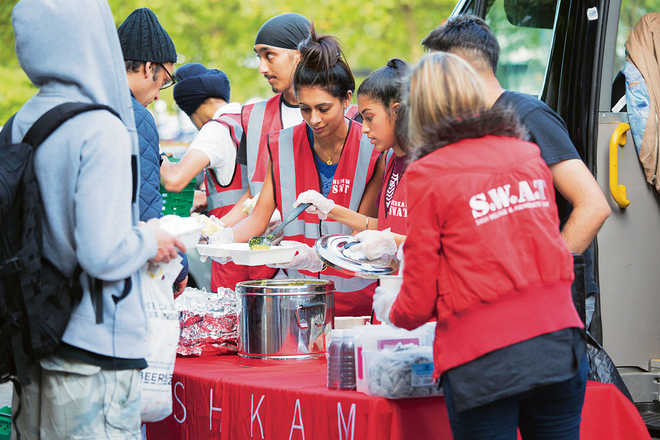Dominic Asquith
A lot has changed since the 1950s, when Sikh settlers from Punjab earned London’s Southall its moniker of “Chota Punjab”. Southall can no longer claim to have the biggest Sikh population in the UK (although it does still boast of one of the largest gurdwaras outside of India). That’s no sign of decline — merely a reflection of the fact that the UK’s nearly half-a-million British Sikhs now live across the country, from Hounslow to Glasgow. Sikh communities are embedded into the fabric of British society. There are now direct flights to Amritsar from Birmingham and — more recently — from London. This April, the UK celebrated its first National Sikh Heritage Month.
What has remained unchanged since the 1950s, however, is the community’s positive influence on UK history, politics, culture and economy. Much as they are here in India, British Sikhs are known at home for their enterprising spirit. Lord Raminder Singh Ranger, appointed last month to the House of Lords (where he joins fellow Lords Indarjit Singh and Ranbir Singh Suri) is a telling example of that spirit. As the story goes, Lord Ranger arrived in the UK in 1971, earning minimum wage at a fast food chain. He launched his first company in 1987 out of a shed with a starting capital of just £2. Today, his business is worth over £200 million and has been awarded five consecutive Queen’s Awards.
Perhaps just as remarkable is the fact that such success is not by any means unique. Entrepreneur Reuben Singh was recognised by the Guinness Book of World Records as the world’s youngest self-made millionaire in 1998 and as a Global Leader of Tomorrow by the World Economic Forum in 2003. Sikh names feature prominently on UK business awards every year. It is estimated that roughly one in three British Sikh families own a business and the community contributes over £8 billion annually to the UK economy.
It’s not just business. In addition to the House of Lords, there are also now two Sikhs in the House of Commons. In the legal field, Lord Justice Rabinder Singh became, in 2003, both the youngest judge to sit in the UK High Court and the first to wear a turban rather than a wig. In another first, he was then promoted to the Court of Appeal. In cricket, Monty Panesar was the first Sikh to represent a nation other than India when he played for England in 2006. And across the third sector, individuals such as Bhai Mohinder Singh of Guru Nanak Nishkam Seva Jatha and Surinder Kaur Ghura of Newcastle tirelessly work to promote inter-faith harmony. Bhai Mohinder was in fact honoured in 2012 with one of the highest Papal Awards for promoting better inter-faith understanding.
Embodying Guru Nanak’s teaching of service, British Sikhs have also championed a commitment to charity — dedicating nearly 65 million hours and £125 million to social causes each year. Organisations like Langar Aid, Midland Langar Seva and Niskham SWAT provide free food to the needy across the UK and internationally. Manjit Gill’s social enterprise ‘Binti’ works in 12 countries, including in the UK and India, to provide affordable sanitary pads for girls and remove the stigma surrounding menstruation. Birmingham-based Sant Baba Joginder Singh Ji Domeli Charitable Trust runs free eye surgery clinics throughout the year, including in Punjab. These are just a selection of impressive examples from the Sikh diaspora.
It would of course be remiss not to mention the long history of Sikhs in the military. More than 3,00,000 Sikh soldiers fought in the two World Wars and British Sikhs continue to serve with distinction to this day. In 2002, the names of all Sikh Victoria Cross and George Cross recipients were inscribed on the monument of the memorial gates on Constitution Hill, next to Buckingham Palace. Last year, Mandeep Kaur became the first Sikh chaplain with the Royal Air Force and Jatinderpal Singh Bhullar made headlines across the UK in 2012 when he became the first member of the Scots Guard to wear a turban instead of a traditional bearskin.
I am conscious that the UK’s complex past with India, including with Punjab, throws shadows on some parts of our history. That should not be forgotten. We must — in keeping with Guru Nanak’s teachings — remember, learn and strive to do better. And as I hope I have managed to convey, there’s much to celebrate as well. In fact, the British Sikh Report 2014 showed 95 per cent respondents were proud of their ‘Britishness’, just as the UK is proud of them.
As the world celebrates the 550th birth anniversary of Guru Nanak, I will be grateful — to his many disciples, who continue to make such a mark on British society. I hope this wealth of wonderful examples continues to define the living bridge between our communities, and our shared future.
Hall of fame
- Reuben Singh: Recognised by Guinness Book as the world’s youngest self-made millionaire in 1998
- Monty Panesar: First Sikh to represent a nation in cricket other than India when he played for England in 2006
- Lord Justice Rabinder Singh: He is both the youngest judge to sit in the UK High Court and first to wear a turban rather than a wig
- Lord Raminder Singh Ranger: Businessman, appointed last month to the House of Lords; was earlier conferred MBE, CBE
- Jatinderpal Singh Bhullar: First member of the Scots Guard to wear a turban instead of a traditional bearskin
- Mandeep Kaur: First Sikh chaplain with Royal Air Force. Born in India, she is an Amritdhari
- Bhai Mohinder Singh: Chairman of Nishkam Group of Charitable Organisations that works for social regeneration, education, health, etc.
Unlock Exclusive Insights with The Tribune Premium
Take your experience further with Premium access.
Thought-provoking Opinions, Expert Analysis, In-depth Insights and other Member Only Benefits
Already a Member? Sign In Now











